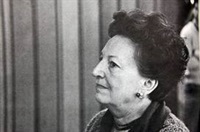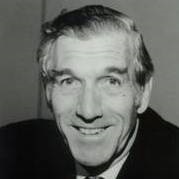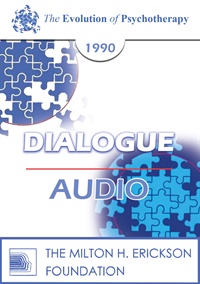EP90 Dialogue 03 - The Legacy of Gregory Bateson - Mara Selvini Palazzoli, MD; Paul Watzlawick, PhD
- Average Rating:
- Not yet rated
- Topic Areas:
- Dialogues | Psychotherapy | Communication | Constructive Narrative | Schizophrenia | Systems Theory
- Categories:
- Evolution of Psychotherapy | Evolution of Psychotherapy 1990 | Pioneers in Couples and Family Therapy
- Faculty:
- Mara Selvini Palazzoli, MD | Paul Watzlawick, PhD
- Duration:
- 59 Minutes
- Format:
- Audio Only
- Original Program Date:
- Dec 12, 1990
- License:
- Never Expires.
Description
Description:
Educational Objectives:
- Given a topic, to become aware of the differing approaches to psychotherapy, and to identify the strengths and weaknesses in each approach
- To learn philosophies of various practitioners and theorists
*Sessions may be edited for content and to preserve confidentiality*
Outline:
Gregory Bateson's Early Life and Influences
-
Paul Watzlawick discusses his early connection with Gregory Bateson, joining MRI in 1960
-
Bateson's father, William Bateson, was a biologist who coined the term "genetics"
-
Gregory Bateson's brother Martin committed suicide, leaving him the sole surviving son
-
Bateson worked for the OSS in Burma countering Japanese propaganda, creating real-world double bind situations
Bateson's Theoretical Contributions
-
Introduced concepts of symmetry and complementarity in human relationships
-
Suggested therapeutic applications of these patterns, such as putting a complementary marriage on a tennis court
-
Developed the concept of deutero learning—learning about learning
-
Emphasized difference in perception and referenced Korzybski’s “the map is not the territory”
Bateson's Research and Communication Studies
-
Studied the pragmatic effects of communication in diverse settings including zoos
-
Analyzed ventriloquist-puppet interaction to understand communication processes
-
Was known as an excellent speaker, sensitive to audience comprehension
-
Hosted open houses with interdisciplinary guests to foster idea exchange
Bateson's Views on Influence and Therapy
-
Had strong aversions to influence and manipulation, which created tension with colleagues
-
Continued to be intellectually active during his long illness until his death in 1980
-
Mara Selvini Palazzoli shares her early exposure to Bateson’s work and its influence
-
Discusses development of positive connotation and family rituals in therapy
Bateson's Legacy and Therapeutic Applications
-
Selvini emphasizes Bateson’s respect for life and the centrality of understanding relationships
-
Introduces the concept of the “imbroglio of affection” in schizophrenic families
-
Notes Bateson's influence on her work in family therapy
-
Watzlawick reflects on the impact of Bateson’s systemic thinking on psychiatry
Bateson's Influence on Therapeutic Techniques
-
Watzlawick discusses Bateson’s role in shaping systemic thinking in therapy
-
Highlights the importance of context in understanding behavior
-
Mentions Bateson’s interest in hypnosis and his connection with Milton Erickson
-
Panelists affirm the continued relevance of Bateson’s ideas in modern therapy
Bateson's Views on Influence and Therapy
-
Panelists explore tensions between Bateson’s resistance to influence and the demands of therapy
-
Emphasize the need for therapists to understand and reflect on their own influence
-
Discuss ethical dimensions of influence in clinical practice
-
Watzlawick shares his personal struggle reconciling Bateson’s anti-influence stance
Bateson's Contributions to Cybernetics and Systems Theory
-
Watzlawick outlines Bateson’s contributions to first- and second-order cybernetics
-
Notes Bateson’s involvement in the Josiah Macy conferences
-
Panelists discuss contemporary relevance of systems theory foundations laid by Bateson
-
Watzlawick critiques misuse of the term “paradoxical therapy” in modern contexts
Bateson's Work on Dolphins and Human Systems
-
Describes Bateson’s studies of dolphin communication and its link to human systems theory
-
Mentions research on octopuses and the challenges of studying aquatic intelligence
-
Panelists explore implications of animal communication research for human relational dynamics
-
Watzlawick reflects on how Bateson’s animal research influenced his own views
Bateson's Influence on Therapeutic Approaches
-
Selvini describes how Bateson’s ideas shaped her work with schizophrenia
-
Emphasizes the significance of understanding relational dynamics in mental illness
-
Panel discusses the integration of biological and relational models in therapy
-
Selvini shares her use of positive connotation and family rituals as therapeutic tools
Credits
Handouts
| Timestamped Transcript (744.4 KB) | 16 Pages | Available after Purchase |
Faculty

Mara Selvini Palazzoli, MD Related Seminars and Products
Mara Selvini Palazzoli, MD, received her MD from the UNiversity of Milan in 1941. She was Director of the New Center for Family Therapy in Milan, and also served on a number of editorial boards. The recipient of the Distinguished Contribution to Research in Family Therapy award from the American Association for Marriage and Family Therapy, she was the author or coauthor of five books, primarily on her approach to understanding and treating families.

Paul Watzlawick, PhD Related Seminars and Products
Paul Watzlawick, received his Ph.D. from the University of Venice in 1949. He has an Analyst's Diploma from the C.G. Jung Institute for Analytic Psychology in Zurich. Watzlawick has practiced psychotherapy for more than 30 years. He was research associate and principal investigator at the Mental Research Institute. He was Clinical Professor at the Department of Psychiatry and Behavioral Sciences, Stanford University Medical Center. Watzlawick is a noted family therapist; he is recipient of the Distinguished Achievement Award from the American Family Therapy Association. Also, he is author, co-author or editor of eight books on the topics of interactional psychotherapy, human communication and constructivist philosophy.
He formulated five axioms. They are:
- It is not possible to not communicate. Every behavior is some kind of non-verbal communication.
- Every communication has a content. In addition, there is 'metainformation', which says how the communicator wants to be understood.
- All partners involved in a communication process also interpret their own behaviour during communication.
- Human communication involves both verbal and non-verbal communication. In addition to the spoken words, there are is also a non-spoken part (gestures, behavior, intonation..) which is part of the communication.
- Communication between humans is either symmetric or complementary. This is based on whether the relationship of those communicating is based on differences or parity.


